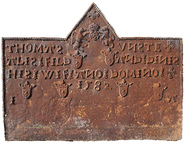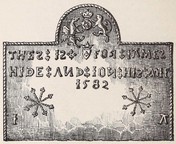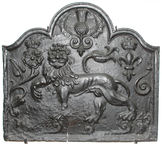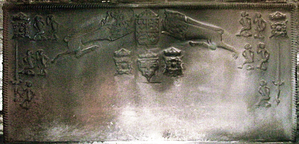-
472
Description: Rectangular with central triangular arch; twisted rope edging (top and sides); in arch, on top, a small cross formed of fleurs-de-lys above a rose and crown with dragon and lion supporters above two crowned shields each bearing a small fleur-de-lys; text across top half, a small cross formed of fleurs-de-lys ending the first and third lines, the top two lines split by the crowned shields, each word separated by two opposed fleurs; below the text, four crowned shields each with a fleur-de-lys, the date between the middle two; lower left, 'I'; lower right, 'A'.
Notes: The inscription can be interpreted as Thomas Anstie alias Field and Denise his wife (etc.), the surname Anstie alias Field being known in the 16th century in central Sussex. A Thomas Anstye married Denys Joyner at Wivelsfield, Sussex on 5th June 1564; illustrated in Lower, 1849 p. 189 with some errors in transcription of the inscription; formerly at 'Misfield' (Miswell), Worth, Sussex. One of a small series of distinctive firebacks cast in 1582, most with inscriptions dedicated to pairs of individuals; the initials IA are likely to be of the founder as they appear in the same arrangement on the other firebacks; the rose and crown and supporters stamp can also be seen on a large fireback, dated 1593, formerly at Baynard's Park, Surrey (no. 200).
Inscription: THOMAS VNSTE / ALIS : FILD AND DINIS / HIS : WIF: ANO : DOMINO: / 1582 / I A
- Decoration tags:
- rectangular with triangular arch (shape)
- rope (edging)
- carved stamps
- individual letters
- individual numbers
- heraldic
- text
Manufactured: in 1582 possibly at Pounsley Furnace, Framfield in the Weald area of England.
Current location: Gwesty Seren Hotel (formerly Bryn Llewellyn), Allt Goch, Llan Ffestiniog, Gwynedd, Wales.
- Attached to series:
- Pounsley series
- 1582 IA series
-
474
Description: Fragment; arched rectangular shape with rounded corners; ovolo within fillet moulding all round; oval Tudor royal shield with garter surrounding, topped with a royal crown; dragon and greyhound supporters; initials split by crown; inscription on a fillet between legs of supporters, behind garter finial; motto on an Ionic plinth at bottom; left hand rectangular extension panel with twisted rope edging on top and side: initials in top left corner, ‘dragon’s head’ in top right corner, rose-en-soleil stamp in centre, rose stamp bottom centre.
Notes: The letters on the extension panel are the same form and size as those on the top of the armorial pattern, indicating that they were added to the armorial, perhaps to indicate a change of reign. The letter 'E' has also been noted on another fireback of the same series. The rose-en-soleil was the badge of King Edward IV and, thus, a Yorkist symbol; it is seen on other firebacks. From a house in Chailey, Sussex. Illustration from Lower (1849).
Inscription: E R / E / R / HONY SOIT QUE MAL Y PAYNCE / Made in Sussex by John Harvo / DV ET MOVN DR...
Arms: Tudor royal
- Decoration tags:
- rectangular with round arch (shape)
- complex individual (edging)
- carved stamps
- whole carved pattern
- individual letters
- armorial
- royal
- text
- animals
- plants
Manufactured: in the mid- to late-16th century in the Weald area of England.
Current location: not known.
- Attached to series:
- Pounsley series
- John Harvo series
- Rose-en-soleil series
-
473
Description: Arched rectangular shape; twisted rope edging (top and sides); in arch; rose and crown with dragon and lion supporters, above a fleur cross and a crowned shield bearing a small fleur-de-lys; text across top half, each word separated by two fleur terminals; lower left and right, twice repeated eight-pointed star design formed of twisted rope with fleur-de-lys terminals; bottom left, ‘I’; bottom right, ‘A’.
Notes: A James Hide married Joan Blackefane at Horley, Surrey on 11th October 1579; illustrated in Lower, 1849 p. 217, when it was at Sutton Hurst, Barcombe, Sussex (still there in 1893, house since demolished). One of a small series of distinctive firebacks cast in 1582, most with inscriptions dedicated to pairs of individuals; the initials IA may be of the founder as they appear in the same arrangement on other firebacks; the rose and crown and supporters stamp can also be seen on a large fireback, dated 1593, formerly at Baynard's Park, Surrey (no. 200).
Inscription: THES : IS FOR IAMES : / HIDE : AND : ION : HIS : WIF [W inverted] / 1582 / I A
- Decoration tags:
- rectangular with round arch (shape)
- rope (edging)
- carved stamps
- individual letters
- individual numbers
- heraldic
- text
- objects
Manufactured: in 1582 possibly at Pounsley Furnace, Framfield in the Weald area of England.
Current location: not known.
- Attached to series:
- Pounsley series
- 1582 IA series
- Fleur rope terminal series
- Fleur-de-lys firebacks
-
901
Description: Quasi-Arched rectangular shape with cyma reversa shoulders; ovolo edging; stylised lion passant guardant; crowned rose with leaf and stem on left, crowned fleur de lys on right, thistle with leaves above centre; three right-facing scrolls at base; down-facing scroll, with staple, on right side; date split between bottom corners; initials below date, bottom right.
Notes: Blatantly Royalist in its symbolism, a variant (no. 763) is dated (perhaps less convincingly) 1649. Numeral style, initials, leaf depiction and the stapled scroll are typical features of firebacks made from patterns by the same maker. A later version of the same subject, but with a different shaped plate and without the fleur-de-lys, is also known (see 'Royalist series'). M. A. Lower writes of this design of fireback being cast at Waldron Furnace in Sussex (Lower, 1849, p.219). Inferior copies of this fireback were advertised in Kings Worthy Foundry's (Winchester) catalogue in the mid-20th century.
Copies of this fireback are known.
Inscription: 16 41 / IM
- Decoration tags:
- rectangular with round arch (shape)
- ovolo (edging)
- whole carved pattern
- heraldic
- royal
- text
- animals
Manufactured: in 1641 possibly at Brede Furnace in the Weald area of England.
Current location: in private hands, Wandsworth, London, England.
- Attached to series:
- IM series
- Hooked '1' series
- Stapled scroll series
- Brede group
-
763
Description: Quasi-Arched rectangular shape with cyma reversa shoulders; ovolo edging; stylised lion passant guardant; crowned rose with leaf and stem on left, crowned fleur de lys on right, thistle with leaves above centre; three right-facing scrolls at base; down-facing scroll, with staple, on right side; date split between bottom corners; initials below date, bottom right.
Notes: Blatantly Royalist in its symbolism, a variant (no. 901) is dated (perhaps more convincingly) 1641. Numeral style, initials, leaf depiction and the stapled scroll are typical features of firebacks made from patterns by the same maker. A later version of the same subject, but with a different shaped plate and without the fleur-de-lys, is also known (see 'Royalist series'). M. A. Lower writes of firebacks of this design of being cast at Waldron Furnace in Sussex (Lower, 1849, p.219). Copies were advertised in F. Parkin & Sons (Exeter) catalogue in 1972.
Copies of this fireback are known.
Inscription: 16 49 / IM
- Decoration tags:
- rectangular with round arch (shape)
- ovolo (edging)
- whole carved pattern
- heraldic
- royal
- text
- animals
Manufactured: in 1649 possibly at Brede Furnace in the Weald area of England.
Current location: Victoria & Albert Museum, Cromwell Road, Kensington & Chelsea, Greater London, England.
Museum number: 492.1901 (part of the Victoria & Albert Museum museum group)
Citation: Lloyd, N., 1925, 'Domestic Ironwork I', Architectural Review, 58, pp. 58-67.
- Attached to series:
- IM series
- Hooked '1' series
- Stapled scroll series
- Brede group
-
595
Description: Rectangular; twisted rope edging (top and sides); top centre; crowned Tudor royal shield with angled lion passant guardant sinister to the left, and an angled lion passant to the right; below, a crowned shield with a fleur-de-lys below initials (over-pressed), between two four-petalled, crowned roses; the same crowned rose repeated in each top corner, below each a vertical dagger, point upwards; inside the roses and daggers, two tiered pairs of ‘imp’ figures, one of each with arm raised, above a single figure, its arms lowered.
Notes: Each dagger, which is seen on two other firebacks (no. 660 and no. 1100), is approx. 35cm long.
Copies of this fireback are known.
Inscription: KH
Arms: Tudor royal arms of England
- Decoration tags:
- rectangular (shape)
- rope (edging)
- carved stamps
- heraldic
- armorial
- royal
- animals
- humans
Manufactured: in the mid-16th century in the Weald area of England.
Current location: in private hands, Wigmore, Herefordshire, England.
- Attached to series:
- Royal series
- Knife & Dagger stamp firebacks





